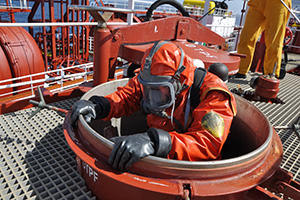Chemical Exposures on Barges & Ships
0) : ?>
One large component of barges is the use of the tanks to store and transport hazardous and flammable chemicals and fuels. Not only is the loading and off loading of these chemicals dangerous, but cleaning tanks and hoses with the product can also be dangerous and even deadly. The tanks on a barge and chemical ships routinely must be cleaned and inspected, whether due to new or different cargo or just to inspect the condition of the tanks below the deck. During these processes, barge workers may be exposed to cancer causing chemicals left behind in the residue and sludge. Exposures also occur during the transport of the cargo form the fumes that are emitted off the tanks.
Cleaning of tanks that had flammable and combustible cargo makes the cleaning process even more dangerous. Whether the workers are cleaning the chemical ship or barge tanks at shore, during transport or in drydock, the hazards of toxic exposure is always present. Before cleaning begins one must inspect the current or last MSDS sheets of the cargo in the tanks along with history of the last numbers of different chemicals or product in that tank. A site plan and work order must be completed and all parties made aware of the dangers involved. Workers must be wearing suitable clothing, gloves and boots to prevent dermal exposures, but also given supplemental air to keep them safe in toxic and low oxygen environments. Flammability levels must be tested and workers must not enter until the levels are as low as 10% of the lowest flammability limit and higher than the highest level. This measurement and testing of the atmosphere must be documented and continually updated as the work is done. Adjacent tanks must also be tested for vapors whether toxic or explosive in cases where two of more tanks share a common vent. Removal of the residue is also a concern as it also may be dangerous to barge workers and others until its final point of disposal. Barge workers cleaning tanks may also be injured in falls inside the tank, slip and falls on deck or down below, lifting injuries and chemical burns among others
Another danger to barge worker is the hazard of the chemicals and petroleum products in the tanks onboard.. Many of these products can cause a fire, explode, corrode and others the exposure may be cancer to the exposed workers. As such, extreme precautions must be taken in the handling and transportation of these chemicals. Barge workers and barge owners must carefully follow OSHA guidelines to educate the workers and help prevent injuries and death. OSHA 29 CFR 1915.1000. Many of the light hydrocarbons and other chemicals and petroleum products contain benzene. After many exposures to low and high levels of benzene containing products some barge workers may be diagnosed with different types of cancer and leukemias including myelodysplastic syndromes MDS, Aplastic Anemia (AA), Multiple Myeloma, acute myelogenous leukemia, AML leukemia and Non-Hodgkin’s Lymphoma (NHL).
Some of those dangerous chemicals and cargo in barge tanks include:
- Acrylates (Ethyl, Butyl, Methyl)
- Benzene
- Caustic/Non-Caustic Lube Oils
- Crude Oil
- Parafins
- Diesel Fuel
- Gasoline
- Gasoline Additives
- Methyl Tert-Butyl Ether [MTBE]
- Reformate
- Isopropanol
- Jet
- Methanol
- Methyl Ethyl Ketone (MEK)
- Styrene
- Toluene
- Xylene
Barge Workers Legal Rights When Injured
Under the Jones Act and General Maritime Law, maritime workers are owed a safe place to work. This would include barge workers that work on the barges, on deck and down below in tanks. When injuries occur the barge worker may be entitled under the Jones Act to collect a daily wage “maintenance” and medical benefits “cure”. In addition, the injured barge worker may be able to file a claim or a Jones Act lawsuit can collect damages under the Jones Act for pain and suffering, medical expenses and lost wages. Others working on barges onshore, at docks and terminals may be covered under General Maritime Laws, State Workers Compensation or Longshoreman and Harbor Workers Compensation Act. The laws and filing deadlines of a claim or lawsuit can be confusing to the injured worker and even for many attorneys. Don’t venture into the legal waters alone, as there are many traps and pitfalls awaiting. Call for a Free Confidential Case Consultation at 1-800-883-9858 or fill out our Online Form and we will get back with you usually within 1-4 hours.
0) : ?>.jpg)